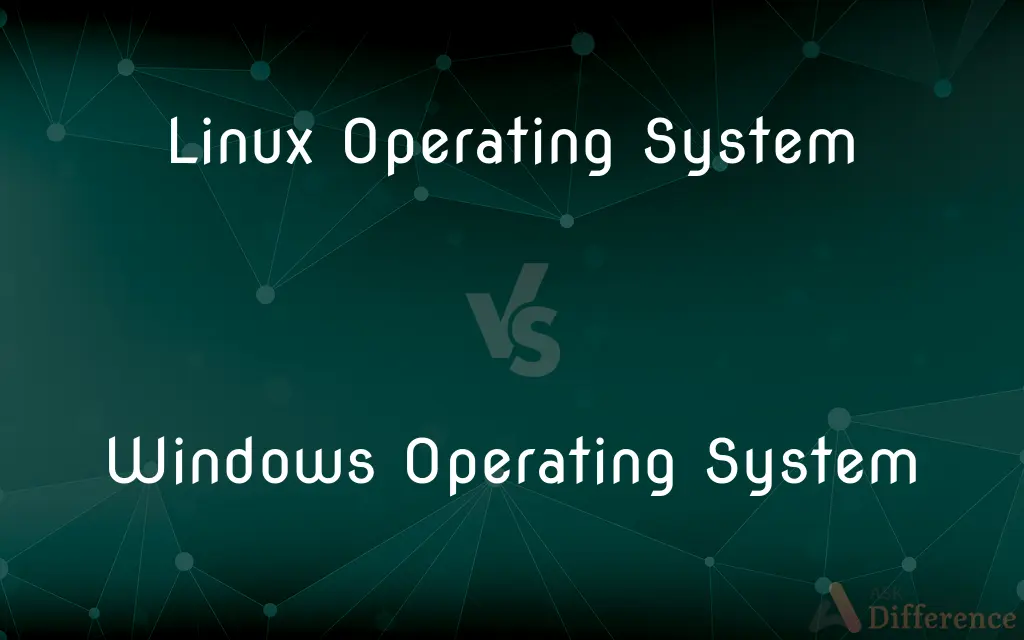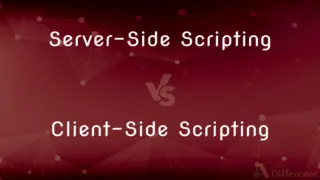Linux Operating System vs. Windows Operating System — What's the Difference?
By Tayyaba Rehman & Fiza Rafique — Published on January 31, 2024
The Linux Operating System is an open-source, Unix-like OS, known for its flexibility and control. The Windows Operating System is a proprietary OS from Microsoft, known for its user-friendliness and broad compatibility.

Difference Between Linux Operating System and Windows Operating System
Table of Contents
ADVERTISEMENT
Key Differences
The Linux Operating System is open-source, allowing users and developers to modify its code, enhancing its flexibility and adaptability. The Windows Operating System, on the other hand, is proprietary, offering a more controlled and uniform user experience.
Linux Operating System boasts strong security features and stability, making it a preferred choice for servers and advanced users. Windows Operating System, with its wide user base, is designed for accessibility, offering a more intuitive interface for everyday users.
In terms of compatibility, the Linux Operating System supports a vast range of software, especially open-source, but can struggle with mainstream commercial software. Windows Operating System excels in software compatibility, especially with popular commercial and gaming software.
The Linux Operating System is often favored for its lower system resource requirements, making it suitable for older hardware. Windows Operating System, while requiring more resources, provides a smoother experience on modern hardware with its optimized performance.
Customizability is a hallmark of the Linux Operating System, offering various distributions for different needs. Windows Operating System, while less customizable, provides a consistent experience across devices with its standardized interface.
ADVERTISEMENT
Comparison Chart
Source Code Accessibility
Open-source, modifiable
Proprietary, not modifiable
User Interface
Varies with distribution
Standardized, user-friendly
Software Compatibility
Strong for open-source
Strong for commercial software
System Resource Usage
Lower, efficient on older hardware
Higher, optimized for modern specs
Customizability
Highly customizable
Less customizable
Compare with Definitions
Linux Operating System
Unix-like OS, known for flexibility and control.
He preferred the Linux Operating System for programming.
Windows Operating System
A consistent and standardized computing platform.
Businesses often prefer the Windows Operating System for uniformity.
Linux Operating System
A versatile, open-source operating system.
The Linux Operating System was installed for its robust security.
Windows Operating System
User-friendly OS with wide software compatibility.
Gaming is often best on the Windows Operating System.
Linux Operating System
An OS favored for its low resource requirements.
Older computers often run efficiently on the Linux Operating System.
Windows Operating System
Operating system optimized for modern hardware.
New laptops are typically equipped with the Windows Operating System.
Linux Operating System
Operating system with multiple distributions.
Ubuntu, a Linux Operating System distribution, was user-friendly.
Windows Operating System
A proprietary operating system by Microsoft.
Most office computers use the Windows Operating System.
Linux Operating System
A customizable OS for various computing needs.
The Linux Operating System was chosen for its server capabilities.
Windows Operating System
An OS designed for broad user accessibility.
She found the Windows Operating System easy to navigate.
Common Curiosities
Is the Linux Operating System free?
Yes, most Linux distributions are available for free.
What is the Windows Operating System?
A proprietary operating system developed by Microsoft, known for user-friendliness.
Is the Windows Operating System easy for beginners?
Yes, its interface is designed to be intuitive and user-friendly.
Can the Linux Operating System run on older hardware?
Yes, it's known for efficient performance on older or less powerful hardware.
What is the Linux Operating System?
An open-source, Unix-like operating system known for its adaptability.
Can I run commercial software on Linux Operating System?
While possible, compatibility is better with open-source software.
Does the Windows Operating System require a license?
Yes, it is a paid operating system, requiring a license.
Is the Windows Operating System suitable for gamers?
Yes, it is preferred for gaming due to better compatibility with gaming software.
Are security updates frequent in the Linux Operating System?
Yes, being open-source allows for regular and community-driven updates.
How customizable is the Linux Operating System?
Highly customizable, with various distributions catering to different needs.
Does Linux Operating System offer good server capabilities?
Yes, it's widely used in servers due to its stability and security.
Is the Linux Operating System good for programming?
Yes, its flexibility and control make it a popular choice among programmers.
Is Windows Operating System compatible with a wide range of hardware?
Yes, it supports a broad range of hardware configurations.
How user-friendly is the Linux Operating System for new users?
It can vary by distribution, some are user-friendly while others are more technical.
Can I customize the interface of the Windows Operating System?
To some extent, but it's less customizable than Linux.
Share Your Discovery

Previous Comparison
Server-Side Scripting vs. Client-Side Scripting
Next Comparison
ArrayList in Java vs. Vector in JavaAuthor Spotlight
Written by
Tayyaba RehmanTayyaba Rehman is a distinguished writer, currently serving as a primary contributor to askdifference.com. As a researcher in semantics and etymology, Tayyaba's passion for the complexity of languages and their distinctions has found a perfect home on the platform. Tayyaba delves into the intricacies of language, distinguishing between commonly confused words and phrases, thereby providing clarity for readers worldwide.
Co-written by
Fiza RafiqueFiza Rafique is a skilled content writer at AskDifference.com, where she meticulously refines and enhances written pieces. Drawing from her vast editorial expertise, Fiza ensures clarity, accuracy, and precision in every article. Passionate about language, she continually seeks to elevate the quality of content for readers worldwide.
















































